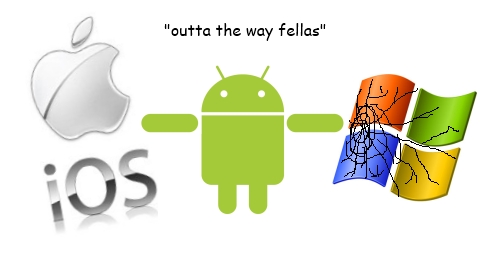Where does Linux fit into a BYOD world?


First, let me explain to you that I've messed with every Linux distribution starting with Slackware back in 1995. I've used every possible window manager and desktop interface offered by the diligent open source community programmers. I like most of them but my current favorites seem to be LXDE or XFCE.
And, for what it's worth, I believe that Linux could be, or could have been, a serious alternative in the desktop market. My opinion doesn't reflect what the majority of people want though. In fact, the market says that Apple's Mac OS X, Apple's iOS and Windows are the desktop systems of choice. On smart phones, Android, a Linux derivative, is a very serious contender. That fact leads me to the meat of the discussion of where Linux fits into a BYOD world.
I don't know what the exact numbers are for Android's share of the mobile phone marketplace but some analysts quote it as high as 60 percent. Let's say, for the sake of argument, that it's 45 percent. That's a huge number of people using Linux. A large number of those are using it in a BYOD setting.
The number of Android users is so high that a few mobile device management (MDM) companies only support Android devices. Most MDM suites support Android and other popular mobile operating systems.
Android is the Great Green Hope for Linux on the "Desktop." Mobile devices have desktops or desktop-like interfaces and Android is really good. Apple's iOS and the new Windows interface are also very good. The real winner is the user. I like BYOD and I like having a choice of operating system for my devices. In fact, I really appreciate MDM vendors who support several different choices because I might carry an Android phone and an iPad one day and on another day, I might have my iPhone with me. All need access. All need management.
I don't want my device banned or denied simply because the MDM doesn't support it.
I don't jailbreak my devices so there's never a chance I'll be denied on that basis. Besides, why the heck would anyone want to jailbreak an Android device? That's one that needs explanation, so please, if you can give me some good reasons for it, please do. Apple's iPhone, iPod and iPad make a good case for jailbreaking--although, as I said, I would never do it. I can certainly understand why someone would on those devices.
Android has a place in BYOD scenarios--a central place. It's one of the Big Three for devices. But, sadly, for the Linux desktop, there's just no room. There never will be. By the time there's a Linux distribution that's truly ready for the desktop, the traditional desktop won't exist.
Linux distro producers should think "Mobile" if they want a place on user devices. Android has proved it.
What do you think? Should Linux distro creators focus on the future of mobility for BYOD or stay stuck in the past? Talk back and let me know.
Related Stories:
Post-PC era means mass extinction for personal computer OEMs
Linus Torvalds finds GNOME 3.4 to be a "total user experience design failure"